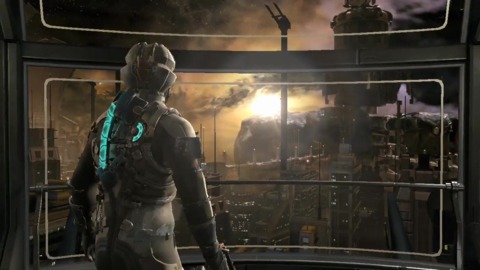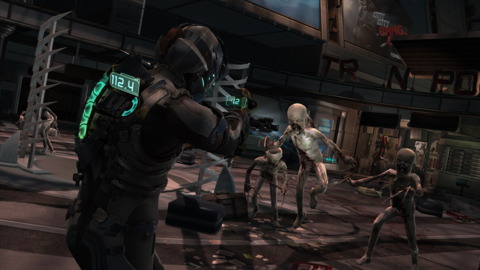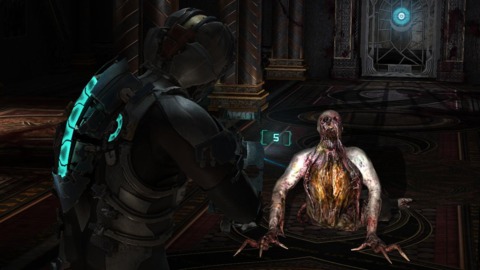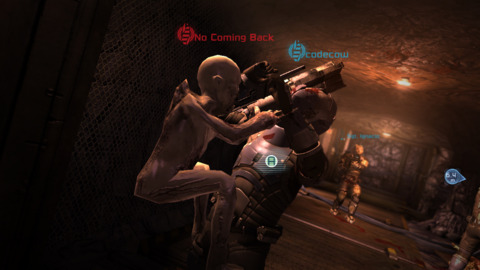Dead Space 2 Review

You're once again in the role of that valiant space engineer Isaac Clarke, the poor sap who was sent on a routine mission to find out why the giant mining ship USG Ishimura had gone dark, and then barely survived the terrible horde of monsters its crew had become. At the end of the first game we saw Clarke escape the Ishimura and destroy the sinister artifact responsible for the whole undead mess, but beyond those final events his fate was unclear. This being a sequel, Clarke is of course pitted against another outbreak of those awful necromorphs, but the game's writers laudably avoid taking the lazy way out by merely having Isaac's superiors transfer him to another mining colony that also happens to get overrun by monsters. All in a day's work, right?

Isaac was silent in the first game largely because the dreadful atmosphere of the Ishimura itself was in a lot of ways the real star of the show. As terrifying as it was, though, the ship was a purely utilitarian mining vessel, and at some point when you've seen one drab industrial corridor, you've seen them all. Dead Space 2 moves the setting to Titan Station, a vast colony built right into the mined-out remnants of Saturn's largest moon. In contrast to the Ishimura, this place is a fully functioning city in space, complete with residential apartments, churches, and schools. You'll find yourself fighting through all of those places, which serves the dual purpose of nicely varying the backdrops and also providing the means for some really uncomfortable scripted situations involving the occasional innocent bystander.

There are a few new weapon types (a minelayer, a sniper rifle) alongside the iconic original guns like the plasma cutter and line gun--and of course there are a few tricky new types of enemies to use them on--but otherwise, the mechanics here feel pretty familiar. You still have peripheral tricks like the stasis weapon that lets you slow down enemies, and the kinetic power that lets you launch objects at them. It didn't occur to me until I threw in the first Dead Space, but everything just moves a bit faster here than in the first game, from the way you move around the environments to even how quickly the clever in-game holographic UI pops up when you grab items. It's a subtle difference but one that improves the overall flow of the action in my opinion.
(It's worth noting the preceding comments about the controls apply only to the console versions, since I didn't have a chance to try the PC version of Dead Space 2 prior to release. A lot of people had trouble with the feel of the first game's aiming on the PC, for what it's worth.)

But the bigger environments and quicker gameplay allow some stunningly larger-than-life action sequences to take place as well. Remember when that giant tentacle came out of nowhere near the beginning of the first game, and you had to actively shoot its weak points as it dragged you through the ship? The sequel has a bunch of stuff like that, amplified by a large factor. There aren't a lot of boss encounters, per se, but you'll certainly have to deal with plenty of giant ugly monsters while in some compromising positions. And while you'll spend lots of time in tight, dark corridors, there are plenty of instances of larger-scale combat against multiple enemies in wider areas, as well. I felt like the designers struck the right balance to keep things varied and still retain this game's identity as a follow-up to Dead Space.
I don't like to spend a lot of time describing the look of a game these days because, hey, it's 2011. That's what we produce videos for. But Dead Space 2's visuals are worth recognizing simply because they're so impressive. The amount of detail in every single room of Titan Station is downright baffling when you consider that someone had to model and texture and assign physical properties to every single surface and object in there. I'm not trying to equate more detail with a better visual style or something, but the game's environments have a stunning amount of craft in them. There's also a great, restrained use of lighting that helps to heighten the tension from area to area. The sound design is just as appropriately horrific; some of the sounds the new necromorphs make from the shadows, announcing their presence before you even see them, are absolutely bloodcurdling. It's a game that looks and sounds incredible, and one that, like the first Dead Space, demands the biggest screen and speakers you can give it.

The good news is the campaign alone is worth playing through two or even three times. I personally enjoyed Dead Space 2 so much that I played through the PlayStation 3 version start to finish, then immediately started another run on the 360, and plan to play it again on the highest difficulty after that. Coming from someone who rarely has the time or interest to play a game more than once, that's saying something. It helps that the designers got the whole "new-game-plus" thing right this time around by allowing you to take your upgraded weapons and gear into subsequent playthroughs, and also that there are numerous achievements and trophies that reward multiple, harder runs through the game(though none, it's worth pointing out, that apply to multiplayer). The two console versions looked virtually identical to me, but I have to give a slight nod to the PlayStation 3 version simply because it ships on one disc, while the Xbox game comes on two and features a disc swap halfway through. The first production run of the PS3 version also contains the previously Wii-exclusive prequel Dead Space Extraction dressed up with HD graphics, optional Move support, and trophies, though subsequent pressings will lose that bonus. For the time being at least, that's a pretty valuable bonus.
Just like its predecessor, Dead Space 2 doesn't do anything especially new, it just does everything exceedingly well. EA's current management set a mandate a few years ago to improve the quality of the company's internal game development, a directive this game and its predecessor directly resulted from. If the Dead Space franchise is ultimately the only memorable result that effort ever bears, it will still constitute a memorable legacy indeed.
